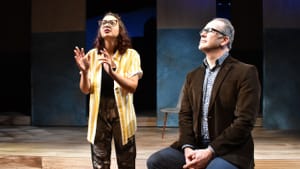Stay in the Loop
BSR publishes on a weekly schedule, with an email newsletter every Wednesday and Thursday morning. There’s no paywall, and subscribing is always free.
No answers, plenty of air
InterAct Theatre Company presents Seth Rozin’s Settlements

Q: How do you write a play about the Israeli-Palestinian conflict that doesn’t make anyone angry?
A: You don’t.
This is exactly the point of Seth Rozin’s world premiere of Settlements at InterAct Theatre, a sort-of retelling of the 2014 Theater J/Ari Roth debacle. In short, Roth was once artistic director of Washington, DC’s Theater J, which was housed in a Jewish Community Center (JCC) and run—and funded—as one of its programs.
Roth liked to stir the pot, presenting controversial work that didn’t always sit well with the organization’s board and members. He also had a reputation for being a bit temperamental. Ultimately, he was fired, a national theater uproar ensued, and he went on to found his own company, DC’s Mosaic Theater (from which he resigned in 2020 after more controversy, and minus a national uproar; make of that what you will).
At the JCC
In Settlements, Roth’s prickly avatar, Noah (Steven Rishard), gets the JCC's okay to commission a play from a Jordanian Jewish artist on the Millennial/Gen Z cusp: nonbinary emerging playwright Yasmine (Becca Khalil) will travel to Israel and the West Bank and write a play about it. Yasmine returns radicalized in the “wrong” direction; hysteria ensues.
The JCC is represented by three Ashkenazi archetypes: Judith (Cindy Gold), the center’s frumpy executive director and devoted functionary; Marion (Emily Zacharias), a perpetual board queen with perfectly coiffed silver hair and a library of designer scarves; and Cesar (Mitch Greenberg), the kind of elder major donor and single-issue voter (Israel), who isn’t afraid to wield his money like a cudgel.
“A truth”
Rozin’s writing is smart enough to find the humor in these characterizations, and it’s at its best whirling through the gloriously frenetic energy of Khalil’s Yasmine—in a nose ring, electric green fishnets, and half-grown-out purple hair. (Natalia de la Torre’s costumes get everyone just right.) The elders’ political leanings show up in the amount of effort they put into Yasmine’s pronouns (they/them), while Yasmine possesses a frustratingly binary political absolutism.
When faced with the prospect of a staged reading before the center’s major donors, they exclaim to Noah, “Fuck yeah! Let’s give these folks a play to rock their worlds … Make them face the truth about Israel!”
Noah adds quickly, half-heartedly, “A truth. Not the only truth.” But treading into these waters gets real deep real fast, and unlike in the buoyant Dead Sea, you’re pretty much guaranteed to sink.
David Winitsky’s humane direction allows this compelling cast to attempt to find balance on their shifting ground. Nobody here is truly happy; once the play is written, even Yasmine’s parents give them the silent treatment. Everyone spends at least a few moments staring into the void, perplexed and discomfited. It’s hard, this occupying the same space on the same planet at the same time while holding conflicting perspectives.
Beyond the play about a play
Of course, this isn't just a play about a play about Israel. Beneath all that posturing lies another important question: what are the limits of artistic freedom? Cesar quotes Hamlet during that post-reading talkback not solely to show off his bona fides, but also to highlight some context. When the Dane commissioned his own play, it didn’t go over so well. Sure, it made Hamlet’s point, but at what cost?
Similarly, as Judith tries to explain, Noah’s intransigence threatens Cesar’s funding, and that “helps sustain lots of other programs: our special needs activities, the lecture series, the youth leadership retreat, Aliyah sponsorship.” This last is the tradition of Jewish return to Israel from the diaspora, and let’s face it, a JCC isn’t primarily a theater, it’s lots of things to a lot of people, and they’re mostly Jews. To Noah and, even more so, to Yasmine, a hard line must exist between funders and content, but at what cost? Is it worth summer camp? Preschool? Community Jewish holiday celebrations? Or is it worth brushing some of the Jewish world’s gravest issues under its rec center carpet and risking irrelevance?
The right answer?
I can’t say the play offers flawless representation of each side’s arguments. For example, Jews lived and fought on that Jersey-sized sliver of the Middle East long before the Holocaust, and sure, I have a few other quibbles, as anyone with an opinion on the subject might. It is also odd, maybe even painful, to hear Yasmine throw out the accusation that “the JCC is a predominantly white institution,” when you’ve grown up learning that Jews are different than white people, but in the context of Yasmine and their BIPOC cohort, well, yeah.
Much as in his 2018 drama Human Rites, which tackled the topic of female genital mutilation in sub-Saharan Africa, Rozin illuminates hidden facets to these arguments, refusing to settle the matter, but giving plenty of room to air them out on the stage of the independent theater he founded to support his mission. Is that, perhaps, the right answer? You decide.
What, When, Where
Settlements. By Seth Rozin, directed by David Winitsky. $15-$35. Through April 24, 2022 at the Drake, 302 S. Hicks Street, Philadelphia. (215) 568-8079 or interacttheatre.org.
InterAct requires proof of Covid-19 vaccination, and masks inside the building. All events are capped at 60 percent of the venue’s total capacity.
Accessibility
The Drake is a wheelchair-accessible venue with gender-neutral restrooms.
Sign up for our newsletter
All of the week's new articles, all in one place. Sign up for the free weekly BSR newsletters, and don't miss a conversation.

 Wendy Rosenfield
Wendy Rosenfield